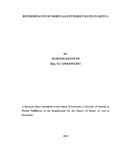| dc.description.abstract | The main objective of this study was to determine the effects of the selected
macroeconomic and financial variables on mortgage rates. The dependent variable was
variable mortgage rate while the independent variables were inflation, Treasury bill rates,
real GDP, interbank lending rate and money supply. The study utilized monthly time
series data between 2000 and 2013. The method of analysis was multiple OLS regression.
Variable mortgage data was collected from five main financial institutions which control
at least 70 % of the mortgage market. Data for inflation, money supply, interbank lending
rate and 182 Days T bills rate was collected from Central Bank while real GDP was
collected from Kenya Bureau of Statistics. The findings showed that inflation, previous
period mortgage rates and real GDP growth were found to have a significance influence
on the variable mortgage rates. Inter-bank lending rate, treasury bill rate and money
supply have negative and insignificant impact on mortgage rates. The policy implication
based on these findings is that regulatory authority should endeavor to achieve lower
rates of inflation. This in turn will lead to lower mortgage rates and promote mortgage
loan uptake. Moreover, the Central Bank should seek monetary policies that promote
supply of credit for mortgage market. The government should also provide a conducive
environment that enhance competitiveness, disclosure of information and reduce
uncertainty in the market. | en_US |

